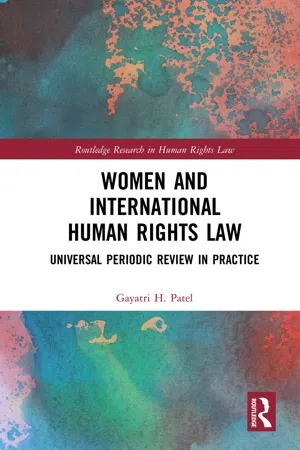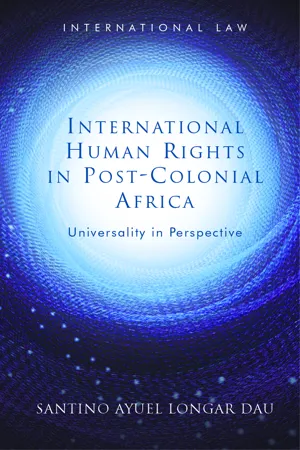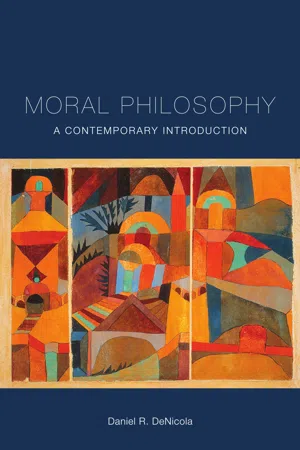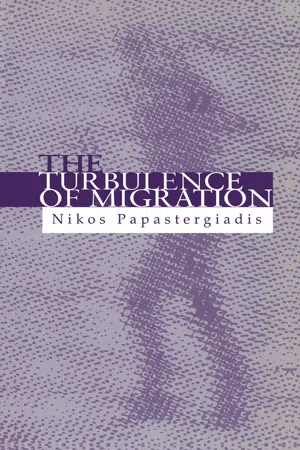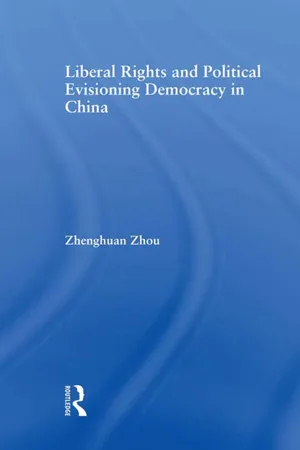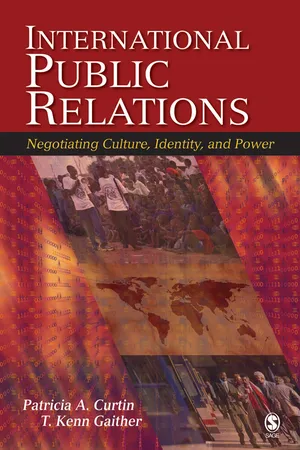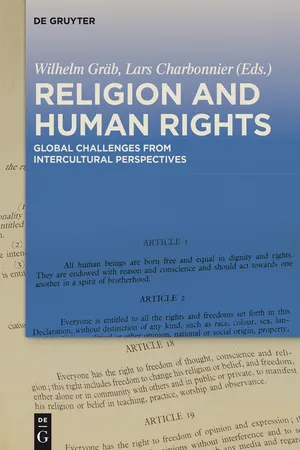Politics & International Relations
Cultural Relativism
Cultural relativism is the belief that a person's beliefs, values, and practices should be understood based on that person's own culture, rather than be judged against the criteria of another. It emphasizes the importance of understanding and respecting different cultural perspectives without imposing one's own values. This concept is often used to promote tolerance and understanding in diverse societies.
Written by Perlego with AI-assistance
Related key terms
Related key terms
1 of 4
Related key terms
1 of 3
8 Key excerpts on "Cultural Relativism"
- eBook - ePub
Women and International Human Rights Law
Universal Periodic Review in Practice
- Gayatri Patel(Author)
- 2019(Publication Date)
- Routledge(Publisher)
In this way, at the risk of oversimplification, Cultural Relativism holds the belief that values and beliefs embedded in culture should be a – or indeed, the – legitimating factor in assessing the validity of international human rights law. At the heart of the theory is an emphasis on the significance of culture in influencing and shaping human behaviour and perceptions in society. 12 It is argued that the influence of culture is so fundamental to all aspects of society that an individual’s perception of the world is unconsciously conditioned by the standards and beliefs of a particular culture. 13 On this basis, the cultural relativist critique challenges the international normative universalist claim of human rights by arguing that moral value judgements, such as interpretations of what constitutes human rights, are relative to different cultural contexts from which such moral judgements arise. 14 Thus, although the universal nature of human rights is often presumed and taken for granted, the influence of Cultural Relativism and in the interpretation and implementation of rights is undeniable. Presenting the two diverging opinions of universalism and Cultural Relativism as polarised and irreconcilable extremes is now a distant past, and instead the two schools are now the focus of substantial and sophisticated scholarly works - eBook - ePub
International Human Rights in Post-Colonial Africa
Universality in Perspective
- Santino Ayuel Longar Dau(Author)
- 2024(Publication Date)
- University of Wales Press(Publisher)
Every culture is largely predisposed to recognise its own normative values as superior to those of other cultures. 130 Because Cultural Relativism derives its essence from the conventional view that customary standards of moral evaluations are inherently subjective, 131 this theory operates to accord deferential treatment to cultural moral judgements in the event of conflicts. To understand the way of life of other societies, one must gain deeper insights into their ‘inner cultural logic’. 132 To appreciate its historical significance and place in contemporary IHRs law, a brief historical account of Cultural Relativism is necessary. 2.3.2 The Origins and Evolution of Cultural Relativism: A Historical Context The universalism versus Cultural Relativism debate is not a novel concept. The debate dates as far back as, specifically among the Greek sophists of the fifth century bce. 133 Ancient Romans would later pick up from the Greeks, and the Romans would, in turn, bequeath these views to Western scholars of the medieval, natural law and natural rights traditions. 134 A more detailed account of the debate in Ancient Greece can be found in the Sophocles’ Antigone, a literary drama in which the title character is depicted as having defied a royal fiat that purportedly decreed that the body of Antigone’s brother, Polynices, be not buried. The decree was an ultimate punishment for Polynices’ previous transgression against city laws. That is, before the battle in which Polynices fell, the king had convicted and sentenced him to death for violating legal customs - eBook - ePub
- Daniel R. DeNicola(Author)
- 2018(Publication Date)
- Broadview Press(Publisher)
Or it may be a crime punishable by law, or regarded as a sin against the gods. 2 Few would deny that moral judgment and ethical practices do in fact differ from one culture to another—despite the affirmation of shared values by religious groups (in the previous chapter). These differences are both temporal and geographic: they are matters of both time and place. No doubt, the culture of ancient Greece differed markedly from the culture of Greece today, which in turn differs from the culture of, say, distant Bhutan. Differences among people, especially differences in perception, opinion, judgment, practices, and forms of life, lead us to relativism. In its most general and abstract form, Relativism is the doctrine that a particular property, and therefore correct judgments about that property, vary in relation to something else. Fashion is a relativistic concept, for example, because what is fashionable varies in relation to time and place. This doctrine stands in contrast to Universalism, which asserts that the property is the same in all times and places. (The concepts of relative and universal judgments introduced earlier are the foundation of these doctrines.) The ethical theory we will now examine is called Cultural Relativism, because it asserts that morality is relative to culture. 3 But now we come to a crucial distinction: relativism may be descriptive or normative. What historical and anthropological studies have shown us is that moral practices and judgments about what is right and wrong in fact vary in relation to time and culture. But that form of moral Cultural Relativism is descriptive only; it details actual differences in conduct and judgment. As such, these are facts about the world. There is a contrasting form of Cultural Relativism that is normative : it is the doctrine that what is genuinely right and wrong—not what people believe and do—varies in relation to culture - eBook - ePub
Youth Ministry as Mission
A Conversation About Theology and Culture
- Brian Hull, Patrick Mays(Authors)
- 2022(Publication Date)
- Kregel Ministry(Publisher)
The impact of Cultural Relativism on cultural anthropology was significant. As anthropologists explored the implications of Cultural Relativism, some, like Melville J. Herskovits (1970, 50–51), recognized that there were serious philosophical implications to the facts of Cultural Relativism and critiqued efforts to separate the reality of cultural differences from value judgements. Even though he claimed that relativism required the withholding of judgment on such “customs as repugnant to [one’s] personal experience as infanticide, head-hunting, various ‘unpleasant’ dietary and sanitary habits, and the like” (1958, 67), Herskovits did not call for behavioral anarchy. However, others pushed for a radical relativism, which asserts that cultures cannot even be compared and, in fact, that a culture can only be understood by someone enculturated in that culture. By insisting that cultures are incommensurable, this view moves beyond the questioning of absolutes and further suggests that there are no universals that can be applied cross-culturally (Edgerton 1992, 26).From this brief historical review of the development of the anthropological doctrine of Cultural Relativism, four points emerge that shape the concept:- Societies’ customs and values must be understood in the context of that culture.
- There are no absolute standards for judging customs.
- All cultures and cultural values are of equal value and dignity.
- We, therefore, should have tolerance and respect for cultural aspects different from our own, even if they are considered evil by our cultural standards.
BENEFITS AND CRITIQUES
There is much to commend in Cultural Relativism. As a central doctrine in anthropology, it provides an effective counterbalance to the evolutionary ideas that affected earlier studies in human diversity, which saw cultures evolving up a ladder of progress. It calls into question the assumed superiority of Western culture over less technologically advanced and primitive cultures, opening the possibility for seeing diverse cultures on their own terms and revealing beauty and harmony in various societal systems. In many ways, Cultural Relativism put understanding, respect, and tolerance on the agenda of Western powers (and many Western missionary efforts) in place of colonization, subjugation, and oppression. - eBook - ePub
The Turbulence of Migration
Globalization, Deterritorialization and Hybridity
- Nikos Papastergiadis(Author)
- 2013(Publication Date)
- Polity(Publisher)
In the context of diasporic communities and global migration, the contest between universalist truth claims in holism and the particularist perspectives of relativism is not simply an academic exercise. Multiculturalism has emerged as a social policy for managing cultural difference, and it is therefore necessary to consider the philosophical frameworks in which it operates. The very recognition that other cultures are different, and that this difference has value in and of itself, marks a shift in the relationship between dominant and minority cultures. For instance, if minority cultures are seen not just as inferior, irrelevant or latent forms which need to be either improved or discarded, but as viable alternatives with their own inbuilt mechanisms of interpretation and representation, then this very recognition is only possible if the concept of cultural difference is already linked to the relativist position of truth claims. Relativism does debunk the authority upon which a singular viewpoint is constituted as the universal. While respecting the different truth claims of other positions, however, relativism can only maintain its calm call for tolerance as long as it maintains a distance from the conflict. Relativism may allow for the recognition of the legitimacy of the other claims, but it does not provide the means for breaking the deadlock between two claims. Conflict is not resolved by this process of recognition; at best it can suggest that differences must be respected and that they find a separate space in which coexistence is possible.In the overlapping and abutting scenarios of the multicultural city, such a discrete space – within which differences are maintained but kept apart from each other – may seem like a false haven. If the multicultural experience is characterized by the constant jostling for space, the negotiation over jagged and loose cultural boundaries, then it is not clear how relativism will allow us to go beyond a mere tolerance of difference, and into a dynamic and inclusive reconfiguration of cultural practice. - eBook - ePub
Liberal Rights and Political Culture
Envisioning Democracy in China
- Zhenghuan Zhou(Author)
- 2013(Publication Date)
- Routledge(Publisher)
The concept of political culture thus defined has the double benefit of allowing general comparison on the basis of different ways of relating both across societies and within a single society and giving sufficient attention to the unique aspects of each culture. Thompson and his co-authors have suggested five ways of relating, arguing that these explain the unity in diversity of human experience. 94 This argument can also be used to tackle the problem of Cultural Relativism and moral relativism the former implies. Sixth, conceiving political culture as a shared way of relating further opens the door to a variety of methodological studies. The traditionalist's account usually takes an interpretative approach, whereas the individualist's study often employs the survey and quantitative research method. Each provides a valuable perspective from which political culture can be effectively investigated, but each is not sufficient by itself to show the multidimensional character of the political culture of a society. The idea of shared ways of relating permits the possibility of broader perspectives by embracing not only the patterns of individual subjective orientations in contemporary cultures, but also traditional values and beliefs; not only the analysis of survey data, but also the analysis of historical documents and the ideas of past thinkers who have helped shape the cultural configurations of contemporary societies. Testing the validity of political culture as a theoretical tool should come from a plurality of methodologies, and this methodological pluralism is more likely to help us minimize the possibility of misjudgment. It should be pointed out that the notion of political culture as proposed by Chilton and Thompson also raises some important questions. For example, Chilton uses the Piagetian idea of moral reasoning and its underlying cognitive structure to provide the basis for comparing politico-cultural developments - eBook - ePub
International Public Relations
Negotiating Culture, Identity, and Power
- Patricia A. Curtin, T. Kenn Gaither(Authors)
- 2007(Publication Date)
- SAGE Publications, Inc(Publisher)
11
Ethical Considerations in Global Practice
A n underlying premise of this book is that public relations practice is grounded in two related concepts: culture and power. Culture informs how we talk, think, and act; in turn, our language, thoughts, and actions are shaped by the relational flow of power. Integral to all communicative enterprises, then, are competing “truths” and power imbalances, making ethics inherent in everyday public relations practice. Although this chapter comes toward the end of the book, it’s anything but an afterthought. It pulls together the ethical underpinnings that have run through the previous chapters to explore and address the ethical challenges posed by international practice.Globalization brings to the forefront of international public relations practice two particular ethical issues resulting from the interplay of culture and power: Cultural Relativism (i.e., how norms and values emerge from cultural contexts) and growing power disparities between the rich and poor, resulting in what many call a new form of colonialism. In this chapter we explore these issues by drawing heavily on the interaction between two moments on the circuit, regulation and identity, to demonstrate how they inform ethical decision making and the ways in which public relations materials are produced, consumed, and represented.THE PROBLEM OF Cultural Relativism
Although globalization has become a recent buzzword, it is not a new phenomenon. Since almost the start of recorded history, civilizations in the Mediterranean, the Indus River valley, East Asia, and other areas established trade routes that brought them into contact with different cultures. With such contact came two realizations: Cultures develop different norms and customs, a phenomenon known as Cultural Relativism, - eBook - ePub
- Wilhelm Gräb, Lars Charbonnier, Wilhelm Gräb, Lars Charbonnier(Authors)
- 2015(Publication Date)
- De Gruyter(Publisher)
Conversely, the intra- and intercultural human rights debate shows how boundaries within a single culture, as well as those between cultures, can be dissolved and shifted, and how new boundaries can be drawn. The boundaries between seemingly immutable cultures are thus no longer upheld, either by social constructs like nation, ethnicity, religion or tradition, or by homogeneous and rigid individual as well as collective identity. Cultural and political identities are continuously coming into being and evolving, by virtue of the dynamic nature of wants and interests, beliefs, moral values and standards.Taking the human rights discourse on universalism versus cultural pluralism in contemporary Arab-Islamic philosophy as an example allows one to examine more acutely the multi-layered processes of self-criticism and dissolution of boundaries.66 The objective of self-criticism is to reveal the limits of the culturally relative view of human rights, and to extricate the universality of human rights from a religious and hegemonic claim to power.Human rights are rights which ought to be afforded to each and every person, irrespective of his or her miscellaneous attributes, and purely by virtue of his or her being human: this is not a mere matter-of-fact definition, but a normative demand, wherein the various historical developments in the implementation of human rights within the individual cultures may not be ignored.67In what follows, the critique of regional Arab and Islamic declarations of human rights will be examined from the point of view of selected positions in contemporary Arab philosophy. In the course of this, three important terms, which are central focuses of this critique, will be drawn upon: (1) Cultural Relativism, (2) historicism and (3) naturalism. By way of regional declarations of human rights, three examples from the Islamic and Arab cultural context will be singled out, which have been ratified by Arab-Muslim states and which are the subject of contentious discussion on both a national and international level: these are The Universal Declaration of Human Rights in Islam,68 of 19th September 1981, The Cairo Declaration on Human Rights in Islam,69 of 5th August 1990, and the Arab Charter on Human Rights,70 of 15th September 1994. An adapted version of this Charter was adopted in 2004, at the Arab League summit in Tunis.71
Index pages curate the most relevant extracts from our library of academic textbooks. They’ve been created using an in-house natural language model (NLM), each adding context and meaning to key research topics.
Explore more topic indexes
Explore more topic indexes
1 of 6
Explore more topic indexes
1 of 4
